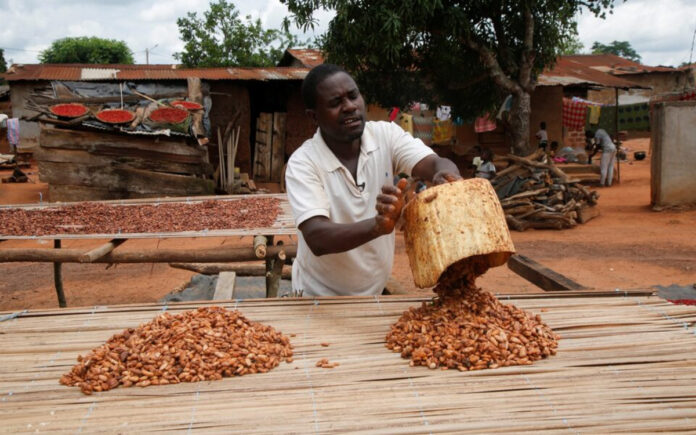Abidjan: Cocoa farmers in key regions of Ivory Coast, the world’s largest cocoa producer, are expressing concerns about the impact of the Harmattan wind on their crops. This seasonal wind, which typically blows in from the Sahara Desert between December and March, has been strong over the past week, coupled with below-average rainfall. Farmers fear this combination could dry the soil and damage cocoa pods.
Farmers Face Uncertainty Amid Dry Conditions
Ivory Coast’s dry season, spanning mid-November to March, is characterized by minimal rainfall. While farmers report sufficient pods to sustain harvesting until late January, they anticipate a sharp decline thereafter if the weather remains unfavorable.
In the west-central region of Daloa and the central regions of Yamoussoukro and Bongouanou, where rain was either absent or significantly below average, farmers voiced concerns about the prolonged dry weather. Albert N’Zue, a farmer near Daloa, stated, “There is no rain, and if the Harmattan remains strong, tree yields will be low from February onwards.”
Farmers warn that if the Harmattan persists and good rainfall does not follow within the next two weeks, the lack of moisture will dry out leaves, weaken trees, and reduce cocoa yields.
Mixed Conditions Across Regions
Despite the challenges in some areas, other regions reported more favorable conditions. In the western region of Soubre and the southern regions of Divo, Agboville, and the eastern region of Abengourou, rains have been sufficient to counteract the Harmattan’s effects.
Also Read | Japan’s Daiwa Securities Targets 5% Wage Hike to Address Talent Crunch
Roger Koffi, a farmer near Abengourou, noted, “We’ve had enough rain. It will help trees produce cocoa from February onwards.” Abengourou recorded 30.1 mm of rainfall last week, exceeding the five-year average by 23.2 mm, providing optimism for future yields.
Market Dynamics and Temperatures
With buyers seeking to fulfill contracts before the year’s end, farmers mentioned an increase in demand for beans. Buyers were offering prices above the farmgate rate of 1,800 CFA francs ($2.88) per kilogram, indicating strong market activity.
Also Read | Portugal’s Property Market Hits Record High, Worsens Affordable Housing Crisis
Last week’s average temperatures across Ivory Coast ranged from 24.2 to 28.3 degrees Celsius, contributing to the variability in cocoa-growing conditions.



